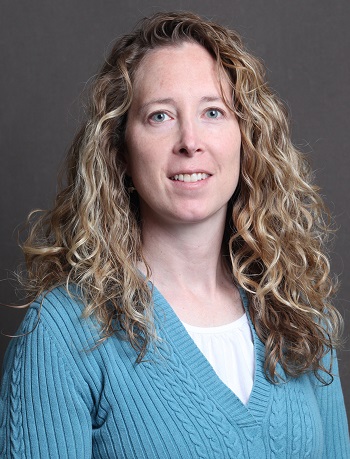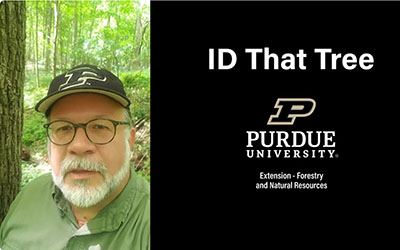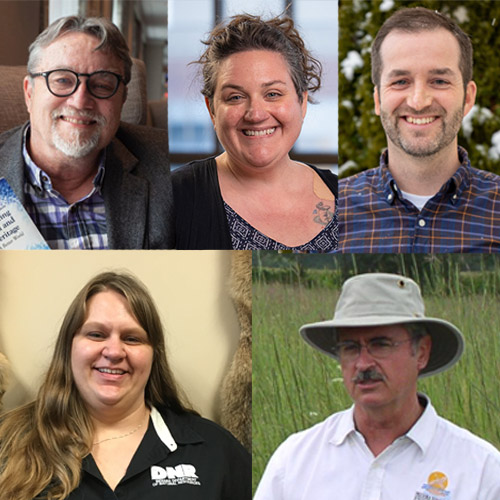Forestry & Natural Resources
TWS Honors Flaherty with Excellence in Education Award
After being named the Student Chapter Advisor of the Year by The Wildlife Society in June 2020, Dr. Elizabeth Flaherty is again being honored by TWS. This time Flaherty is being recognized for her work in the classroom and her mentorship to students with the 2021 Excellence in Wildlife Education Award.
The Excellence in Wildlife Education Award celebrates sustained exemplary teaching and contribution to the improvement of wildlife education by honoring individual faculty members.
"Dr. Flaherty is known for fostering student curiosity and interest in science and the field of wildlife ecology and management by providing students with an opportunity to construct and investigate their own questions using hands-on research and field experiences while increasing students’ understanding of the nature of science,” said Dr. Bob Wagner, Purdue Forestry and Natural Resources department chair. “Her leadership in wildlife education and innovative and sustained contributions to improving the education of the next generation of wildlife ecologists is quite impressive.”
Flaherty teaches three of the required courses in the wildlife major: Wildlife Habitat Management, Wildlife Investigational Techniques, and Forest Habitats and Communities. She also teaches the Optimizing Conference Attendance course, developed alongside FNR colleague Dr. Pat Zollner, as well as a graduate-level required Intro to Teaching Natural Resources course. Flaherty also has led study abroad courses in Cuba (2016) and Ecuador (2019).
She utilizes a hybrid-flipped design to structure her courses, asking students to complete readings or watch videos before class so they can actively engage during formal lecture time. She also incorporates in-class discussions and active learning to engage students with the course material.
“Ultimately, my teaching is student-centered involving considerable active learning opportunities, while I share my passion for wildlife and for science with students,” Flaherty explained.
In addition to her teaching role, Flaherty mentors students inside and outside of the classroom. Each semester she has several undergraduate students actively involved in research in her lab either working on their own projects or collaborating with graduate students. Recently she developed partnerships with state management agencies on projects using stable isotope analysis to monitor freshwater mussel populations in Indiana and evaluating the impacts of baiting during the hunting season on population demographics of black bears in Maine. Her students co-author research manuscripts and often go on to attend national conferences to present their research results.
As the advisor of the student chapter of The Wildlife Society since 2018 as well as for the Quality Deer Management Association club from 2014-18, Dr. Flaherty works directly with the club officers, leads workshops on topics including field safety and survival skills, and participates with the students in many activities from bird watching to building wood duck nest boxes and more.
Flaherty not only impacts her students through teaching and mentorship, but also through the development of skills they will use in the professional world, such as critical thinking, collection and analysis of data, professional writing, and more. She also provides students with relevant, real-world examples using current events, her own research and experiences, guest speakers and readings from scientific journals and news articles.
“Dr. Flaherty really cares about her students’ education and it is reflected in how she runs the course,” one of her students said in an evaluation. “She goes out of her way to make assignments that will educate and challenge us. I feel I have grown as a student being in her courses.”
Dr. Brandon Quinby, who completed his PhD under Flaherty echoed the sentiment.
“Dr. Flaherty is often touted as one of the favorite faculty members within the department by both undergraduate and graduate students alike,” Quinby said. “This is not to say that her courses are easy, in fact they are often very challenging. However, Dr. Flaherty is dedicated to using the most current pedagogical approaches and finds ways to empower students to scaffold their own knowledge and take pride in their education and learning environment. This is further helped by Dr. Flaherty’s ability to make every learning environment inclusive and welcoming to her students.”
 Another student shared the extended impact of Flaherty’s teaching -
Another student shared the extended impact of Flaherty’s teaching -”(Dr. Flaherty) has played a significant role in my development academically, professionally and career-wise,” 2021 graduate Rachel Brummet said. “Her emphasis on critical thinking, student engagement, professional skill-building and career development contribute to how she stands out among other professors in the classroom. Additionally, her character commands respect of her pupils; she sets high expectations and goes above and beyond to ensure that students have access to every resource needed to achieve success in her courses. She is inspiring and sets an incredible example by her passion, devotion and personal achievement. My experience at Purdue would not have been the same without Dr. Flaherty.”
Flaherty is dedicated to educating students outside of the school year as well. In the summer, she leads the eight-week Research and Extension Experience for Undergraduates (REEU) program, which is focused on recruiting underrepresented students into the natural resource sciences.
Dr. Flaherty also is committed to helping her peers sharpen their teaching skills, with 17 peer-reviewed publications on the pedagogy of wildlife education to her credit. Flaherty also shares teaching materials and results research from her work in teaching and learning with other science educators through peer-reviewed publications, presentations and workshops.
Alongside eight other mammalogists from across the United States, Flaherty developed a networked system of course-based undergraduate research experience (CURE) modules that incorporate authentic research experiences into undergraduate ecology and wildlife classrooms. In 2020, the group received funding from the National Science Foundation to expand the network and assess the outcomes for students and instructors. Instructors at more than 40 institutions are now using the Squirrel-Net modules in their classrooms.
“Dr. Flaherty is an effective, dedicated, and exemplary educator across all levels,” a peer at another institution stated. “She is a visionary in the preparation and delivery of educational material aimed at equipping and strengthening her students.”
Flaherty joined the Purdue FNR faculty in 2013 as an assistant professor of wildlife ecology and habitat management. She was promoted to associate professor in 2019. Throughout her time at Purdue, Flaherty has been continually honored for her teaching prowess.
In 2019-20, Flaherty was named a Murphy Award winner and also was inducted as a Purdue Teaching Academy Fellow. Previously, she earned the Teaching Leadership Award from the Purdue University Teaching Academy and the Center for Instructional Excellence, received the College of Agriculture’s Kohls Undergraduate Teacher Award (Much to learn from annual Celebration of Teaching Excellence), and was an Honorable Mention selection for the college’s Unsung Diversity Hero Award. Flaherty was honored with FNR’s Outstanding Undergraduate Teaching Award in 2017 and 2018.
The Wildlife Society’s 2021 award recipients will be recognized at the TWS annual conference, which will take place virtually from November 1-5.






